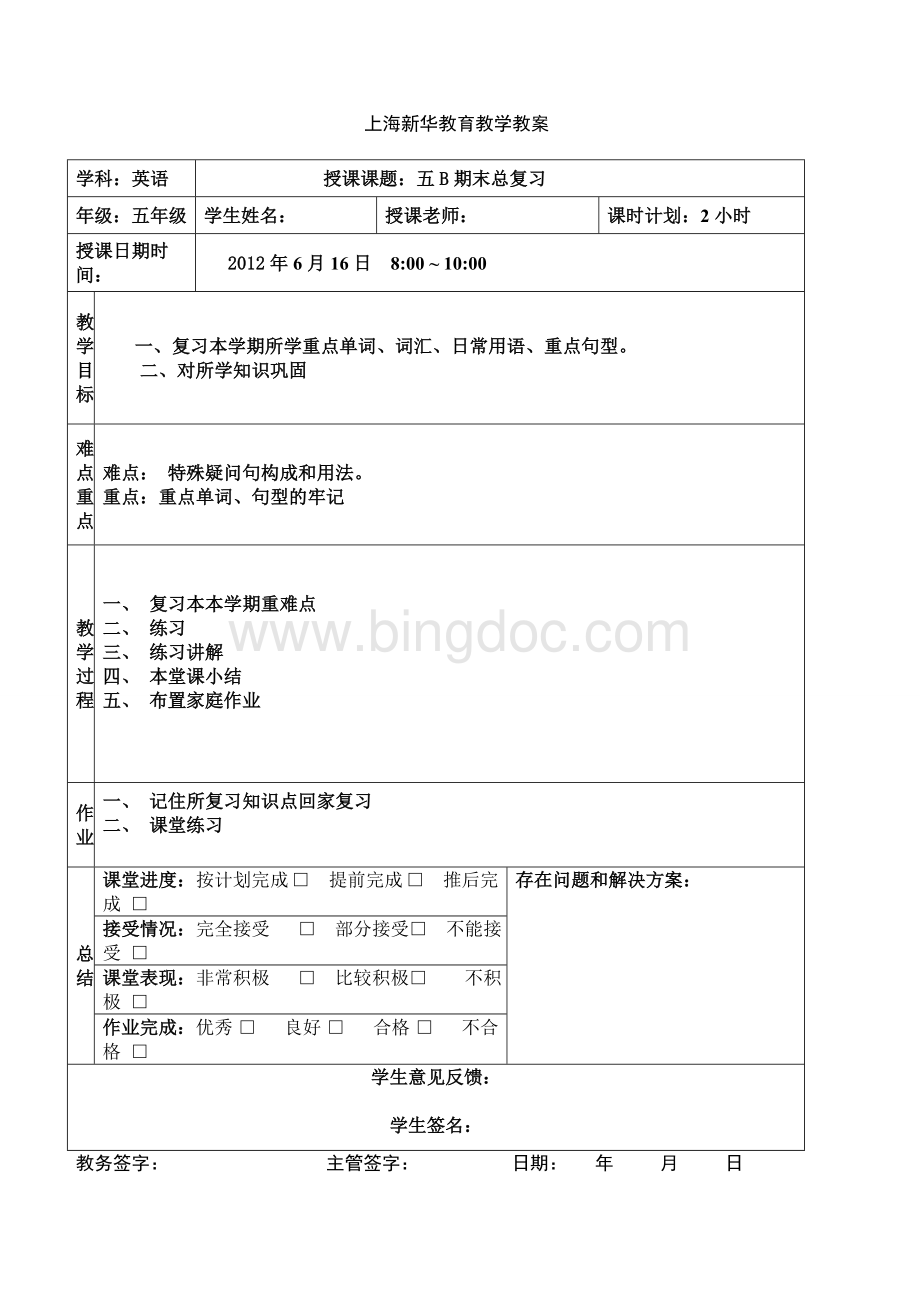上海小学英语五年级下册期末总复习教案Word文件下载.doc
《上海小学英语五年级下册期末总复习教案Word文件下载.doc》由会员分享,可在线阅读,更多相关《上海小学英语五年级下册期末总复习教案Word文件下载.doc(10页珍藏版)》请在冰点文库上搜索。

课堂表现:
非常积极□比较积极□不积极□
作业完成:
优秀□良好□合格□不合格□
学生意见反馈:
学生签名:
上海新华教育教学教案
教务签字:
主管签字:
日期:
年月日
上课内容
语法回顾
一、人称代词
人称
单数
复数
主格
宾格
第一人称
I
me
we
us
第二人称
you
第三人称
he
him
they
them
she
her
it
人称代词主格:
作主语,表示谁怎么样了、干什么了。
Iamateacher.Youarestudent.Heisastudent,too.We/You/Theyarestudents.
人称代词宾格作宾语,表示动作行为的对象。
Giveittome.Let’sgo(let’s=letus)(让学生举一反三,例如将me变为us,让其英翻汉或者汉翻英)
二、物主代词
类别
第一
第二
第三
形容词性物主代词
my
your
his
its
our
their
名词性物主代词
mine
yours
hers
ours
theirs
翻译
我的
你的
他的
她的
它的
我们的
你们的
他(她、它)们的
形容词性物主代词(my/your/his/her/its/our/their)+名词
而名词性物主代词(mine/yours/his/hers/its/ours/theirs则相单于形容词性物主代词+名词,故其后不必加名词。
如:
Isthisyourbook?
No,,itisn’t,it’shers(herbook)Jim’s,Tom’s,Maria’s
(让学生自己分别用两种词性的物主代词造句)
祈使句
1)Let'
s开头的祈使句如:
Let'
ssayitinEnglish.
2)动词原形开头的祈使句.如:
Listentotheteacher.
3)以Please开头的祈使句如:
Pleasetakeamessageforhim.
4)Nevercopyyourclassmates’homework.
5)带呼语的祈使句,如:
Mary,comedownhere!
(对mary讲话,而不带呼语的且以动词原形开头的祈使句则对第二人称讲话)
1.一般现在时:
“总经常有每没复星周”(典型例句:
Igotoschooleveryday.)
总:
always,usually等
经常:
often
有:
sometimes(记住,“有”不是have,而是“有时”)
每:
everyweek/month/year等
没:
never
复星周:
onMondays,onTuesdays等
一般现在时如果主语是复数、第一人称、第二人称和第三人称复数形式时动词用原形;
当句子的主语是单数第三人称或单数名次时,句子的位谓语动词就要用单数第三人称形式。
动词的第三人称单数变化规则:
(以例句为主体,通过改变人称来改变动词形式)
1、一般情况下,动词后直接加s,
works,gets,reads等。
2、以s,x,ch,sh或o结尾的动词,在后面加es,
goes,teaches,washes等。
3、以辅音字母加y结尾的动词,把y变为i,再加es,
study--studies,try--tries,carry--carries等。
4、动词have遇在主语是第三人称单数时,have改为has,
Hehasaninterestingbook.
5、动词be遇有主语是第一人称单数时,be改为am,遇有主语是第二人称时,be改为are,遇有主语是第三人称单数时,be改为is
2.一般过去时:
“昨天上个XX(表示时间点或时间段)前,in加年份when字连”
昨天:
yesterday,后面可以加morning,afternoon,evening等
上个:
last,后面可以加week,month,year等
XX前:
ago,前面可以加threeweeks/months/yearsago
in加年份:
in2009/2008/1986/1220等,2010前全用一般过去时,
when字连:
whenIwasachild等when字后面都是过去时,也要用一般过去时。
用一般过去式时,动词的形式用过去式
动词的过去式变化规则:
一般情况下,动词词尾加ed,如:
work—worked;
play—played;
want—wanted;
act—acted
以不发音的e结尾动词,动词词尾加d,如:
live—lived;
move—moved;
decide—decided;
decline—declined;
hope—hoped;
以辅音字母+y结尾的动词,把y变为i再加ed,如:
studiedtriedcopiedjustifiedcriedcarriedembodiedemptied
以一个辅音字母结尾的重读闭音节动词,双写词尾辅音字母,再加ed,如:
stoppedbeggedfretteddraggeddroppedplanneddotteddripped
不规则动词的过去式大体上归纳有以下六条记忆法:
(1)以t结尾的词,过去式与原形相同。
put—put,let—let,cut—cut,beat—beat
(2)以d结尾的词,把d变成t。
如:
build—built,lend—lent,send—sent,spend—spent
(3)以n结尾的词,在词后加t。
mean—meant,burn—burnt,learn—learnt
(4)以ow/aw结尾的词,把ow/aw变成ew。
blow—blew,draw—drew,know—knew,grow—grew
(5)含有双写字母的词,将双写改为单写,在词尾加t。
keep—kept,sleep—slept,feel—felt,smell—smelt
(6)含有元音字母o/i的词,将o/i变成a。
sing—sang,give—gave,sit—sat,drink—drank
但也有例外,如get的过去式是got,与第一条不符,仅仅是大多数动词符合。
(对于不规则变化,以记忆主要几个动词的变化为主。
)
3.现在进行时:
“现在时刻看和听,最近在哪请安静。
”
现在:
now,atpresent,atthemoment等
时刻:
It’steno‘clock.I’mbeatingXiaoqiang.
看和听:
Look!
Listen!
后面一般都用现在进行时。
最近:
Whatareyoudoingrecently/thesedays?
在哪:
WhereisXiaoZ?
XiaoZisbeatingXiaoqiang.
请安静:
Bequiet!
/Don‘tmakeanynoise!
/Stopmakingnoise!
Xiaoqiangissleeping.
可数名词复数的规则变化
一般情况加-s
1.清辅音后读/s/;
map-maps
2.浊辅音和元音后 bag-bags
读/z/;
car-cars
以s,sh,ch,
x等结尾的词 加-es 读/iz/ bus-buses
watch-watches
以ce,se,ze,
(d)ge等结尾
的词 加-s 读/iz/
以辅音字母+y 变y为i
结尾的词 再加es 读/z/
babybabies
其它名词复数的规则变化
1)以y结尾的专有名词,或元音字母+y结尾的名词变复数时,直接加s变复数:
如:
twoMarys theHenrys
monkey---monkeys holiday---holidays
比较:
层楼:
storey---storeys story---stories
2)以o结尾的名词,变复数时:
a.加s,如:
photo---photos piano---pianos
radio---radios zoo---zoos;
b.加es,如:
potato--potatoes tomato--tomatoes
c.均可,如:
zero---zeros/zeroes
3)以f或fe结尾的名词变复数时:
belief---beliefs roof---roofs
safe---safes gulf---gulfs;
b.去f,fe加ves,如:
half---halves
knife---knives leaf---leaves wolf---wolves
wife---wives life---lives thief---thieves;
名词复数的不规则变化
1)child---children foot---feet tooth---teeth
mouse---mice man---men woman---women
注意:
与man和woman构成的合成词,其复数形式也是-men和-women。
如:
anEnglishman,twoEnglishmen.但German不是合成词,故复数形式为Germans;
Bowman是姓,其复数是theBowmans。
2)单复同形 如:
deer,sheep,fish,Chinese,Japanese
Module1
Unit1日常用语
Whatamess!
WhatshouldIdo?
Whoseballisthis?
ItisMissFang‘s.
Arethosebooksherstoo?
Putallherbooksonherdesk.Canyouputitinthebox?
Theyaremygloves;
theseglovesareformyhands.
Theboxfallsontothefloor.
Becareful.Thenailsaresharp.Jim’sfathergiveshimablackstone.
Itishardandsmooth.Allthenailssticktothestone.
Soonthefloorcleans
again.
Unit2日常用语
Doyouknowhowa……?
ButnowIamabutterfly,flyinghighinthebrightbluesky.
First……Next……Then…..Finally……
Abutterflyisaninterestinginsect.Itwasawhiteegg,nowitisagreencaterpillar.Itlikeseatingleaves.
Itwasabrowncocoon,nowitisabeautifulbluebutterfly.Iputthesilkwormsontheleaves.
Thesilkwormsaresmall,nowtheyarebig,theycanmakealotofsilk.
Thecocoonsopen,fivesilkwormscomeout.Theycanlayeggs.Caterpillarslikeeatingleaves.OnceIwasababy,cryinginmybed.ButnowIambigandtall,playinghappilywithmyfootball.
Itisborninariver,itisblackandsmall.
Yourmumhasbigeyesandmouthandshecancatchflies.
Unit3日常用语
Itistoonoisyoutside.Sheheardanothernoise.Bendidnotlikeitatall.
Sometimesitissonoisy.
ItwasSaturdayafternoon,kittywasathome,shewantstoreadabook.Butitwastoonoisyoutside.
Finally,itwasquiet.Theysatonthesofaandwatchedacartoon.Whatnoisecanyouheararoundyou?
TherewasapopgroupatCitySquare.Theyplayedsomeloudmusic.
Benenjoyedtheloudmusicverymuch,hehadgreattime.
KittywantstoplaysomeloudmusicforBen.Mycityisanoisyplace,withallthecarsandbuses.
Mycityisanoisyplace,butit’snotloudeverywhere.Ilovegoingtothelibrarytoreadthegoodbookshere.
OnSundaymorning,it’salwaysniceandquiet,Icanhearthebirdssinging.Thekingsbirthdayiscoming.
Hewantstolistentheloudestnoiseintheworld,soallthepeoplemustshouttogetherat12o’clock.Onhisbirthday.
Allthepeoplehearabouthisidea.
At12o’clock.Ontheking’sbirthday,peopleallopentheirmouthsandlisten.
Theyhearthesongsofthebirdsandtheriver.Afterthatpeopledoeverythingquietly.
Module2
Unit1重点句型
Whatdidyouhaveforbreakfastthismorning?
Ihad……
Breakfastisveryimportant.
Weshouldeatbreakfasteverymorning.
……is/aremyfavouritefood/breakfast.
Anappleadaykeepsthedoctoraway.
Whathappenstoyou?
=what'
swrongwithyou?
=whatisup/matterwitheyou?
Unhealthychildreneatalotofsweets,hamburgers,icecreamandchocolates,theydrinkalotofsoftdrinks.
Unhealthychildrendonotplaysportveryoften,theywatchtoomuchTVandeattoomuchsweetfood.
Healthychildrenlikerunning,jumping,andplaying,theyeatalotoffruit,vegetablesandsomemeat.
Matteeatsalldayandnight,soonhebecomesveryfat.
Unit2重点句子
Hereweare.Bequick.
Shallwegotoseeafilmthisevening?
Whichfilmdoyouwanttosee?
That’s80yuan,please.It’sonattwoo’clock.
CanIhavethreeticketforSnowWhite,please?
--CanIhaveacupoftea,please?
--Yes,youcan.Hereyouare.
Let’sleaveatonethirty.
That’sagoodidea!
Allright!
Thefilmstartsinfiveminutes.Letmebuytheticketfirst.
Whoisthefairestofall?
Shelookslikeanoldwoman.
ThehuntertakesSnowWhiteintoaforestandlethergo.
ShallIhelpyoucarryyourbag?
Unit3重点句子
Whatclassesdowehavetoday?
WehaveChinese,Maths,ArtandITinthemorning.
Whatisyourfavouritesubject?
Thereisashortbreakaftereachclass.It’stimeforChineseclass.
InPEclasswehavegreatfun.Whatdoyouthink,Danny?
Thanksforyourhelp,Danny!
Thisismytimetablefortoday.
Atschoolwelearnthingeveryday.
InMathsclasswecountfromonetoten.
Hedrawssomelinesanddotsonthepaper.Peterlooksathispapercarefully.
MaybeIwilldrawahouseintherain.Itneedssomecolour.
Hecolourshispicture.
Module3
Unit1日常用语
Youcan’tridehere.
Lookatthesign.Youcan'
twalkyourdoghere.Nosmoking/swimming.
Theyaresittingonthebench.Theparkkeepercomes.Don'
tlitter/throwrubbish.Don'
twalkonthegrass.
Whatdoesthissignmean/say?
Itmeans/sayswecan’tswim.Wewanttohaveapicnicinthepark.Iwanttopicksomebeautifulflowers.Shesaidtoherself.Heputsomestonesintohispocket.Onthewaytotheforest,hedroppedthestones.Wearelost.Don'
tworry.Wecanfollowthestonesbackhome.
I’llcomeback.
Unit2常用语
Itwillbewindytonight.
Howistheweathertoday?
=Whatistheweatherliketoday?
Whatisthetemperaturetoday?
Itis30degrees.
Whatdayistoday?
ItisSunday.
Whatisthedate
today?
Itis1stofMay.
Whatisyourfavouriteseason?
Ilovesummer.
Wehadahotandsunnydayyesterday.
Wewillhaveheavyrainandastrongwindtomorrow.Iliketherai